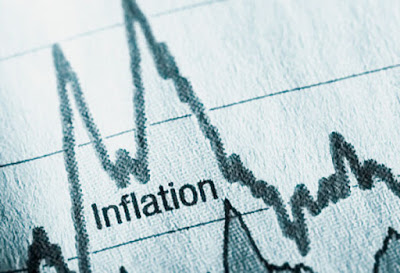The National Bureau of Statistics (NBS), says Nigeria’s headline inflation rate increased to 21.82 per cent on a year-on-year basis in January 2023.
This is according to the NBS Consumer Price Index (CPI) and Inflation Report for January 2023 released in Abuja on Wednesday.
According to the report, the figure is 6.22 per cent points higher compared to the 15.60 per cent recorded in January 2022.
It said on a month-on-month basis, the Headline inflation rate in January 2023 was 0.47 per cent higher than the rate recorded in December 2022 at 21.34 per cent.
The report said the increase in the inflation rate was largely attributed to the rise in prices of Bread and Cereal at 21.67 per cent.
“Actual and Imputed Rent at 7.74 per cent, Potatoes, Yam and Tuber at 6.06 per cent, Vegetables at 5.44 per cent, and Meat at 4.78 per cent.’’
It said the percentage change in the average CPI for the 12 months ending January 2023 over the average of the CPI for the previous 12 months period was 19.36 per cent.
“This indicates a 2.49 per cent increase compared to the 16.87 per cent recorded in January 2022.’’
It said increases were recorded in all Classification of Individual Consumption by Purpose (COICOP) divisions that yielded the headline index.
The report said the food inflation rate in January 2023 was 24.32 per cent on a year-on-year basis, which was 7.19 per cent higher compared to the rate recorded in January 2022 at 17.13 per cent.
“The rise in food inflation is caused by increases in prices of bread and cereals, potatoes, yams and other tubers, and oil and fat, fish, vegetable, fruits, meat, and food products .’’
It said on a month-on-month basis, the food inflation rate in January was 2.08 per cent, which was a 0.19 per cent rise compared to the rate recorded in December 2022 at 1.89 per cent.
According to the report, the increase was attributed to a rise in prices of some food items like oil and fat, bread and cereals, fish, potatoes, and yam and tubers.
“The average annual rate of food inflation for the 12 months ending January 2023 was 21.53 per cent, which was a 1.44 per cent points increase from the average annual rate of change recorded in January 2022 at 20.09 per cent.
The report said the “All items less farm produce’’ or Core inflation, which excludes the prices of volatile agricultural produce stood at 19.16 per cent in January 2023 on a year-on-year basis.
“This increased by 5.29 per cent compared to 13.87 per cent recorded in January 2022.’’
On a month-on-month basis, the core inflation rate was 1.82 per cent in January 2023, which was a 0.49 per cent rise compared to what it stood at in December 2022 at 1.33 per cent.
According to the report, the highest increases were recorded in prices of gas, liquid fuel, and passenger transport by air, vehicle spare parts, fuels, and lubricants for personal transport, equipment, solid fuel, etc.
“The average 12-month annual inflation rate was 16.52 per cent for the 12 months ending January 2023, this was 3.19 per cent points higher than the 13.33 per cent recorded in January 2022.”
The report said on a year-on-year basis in January 2023, that the urban inflation rate was 22.55 per cent, which was 6.38 per cent higher compared to the 16.17 per cent recorded in January 2022.
“On a month-on-month basis, the urban inflation rate was 1.98 per cent in January 2023, representing a 0.17 per cent increase compared to December 2022 at 1.80 per cent.’’
It said the corresponding 12-month average for the urban inflation rate was 19.91 per cent in January 2023.
“This was 2.48 per cent higher compared to the 17.44 per cent reported in January 2022.’’
The report said on a year-on-year basis in January 2023, the rural inflation rate was 21.13 per cent, which was 6.08 per cent higher compared to the 15.06 per cent recorded in January 2022.
“On a month-on-month basis, the rural inflation rate in January 2023 was 1.77 per cent, which increased by 0.14 per cent compared to December 2022 at 1.13 per cent.’’
It said the corresponding 12-month average for the rural inflation rate in January 2023 was 18.84 per cent, which was 2.53 per cent higher compared to the 16.31 per cent recorded in January 2022.
On states’ profile analysis, the report showed in January 2023, all items inflation rate on a year-on-year basis was highest in Bauchi at 24.79 per cent, followed by Ondo at 24.54 per cent, and Anambra at 24.51 per cent.
It, however, said the slowest rise in headline year-on-year inflation was recorded in Jigawa at 19.09 per cent, followed by Borno at 19.62 per cent, and Sokoto at 19.90 per cent.
The report, however, said in January 2023, all items inflation rate on a month-on-month basis was highest in Lagos at 2.91 per cent, Taraba at 2.84 per cent and Ondo at 2.68 per cent.
“While Yobe at 0.54 per cent followed by Jigawa at 0.73 per cent and Oyo at 0.87 per cent recorded the slowest rise in month-on-month inflation.”
The report said food inflation in January 2023, on a year-on-year basis, was highest in Kwara at 29.03 per cent, followed by Lagos at 27.67 per cent, and Ondo at 27.38 per cent.
“Jigawa at 19.22 per cent, followed by Sokoto at 20.80 per cent and Yobe at 21.32 per cent recorded the slowest rise on year-on-year food inflation.’’
The report, however, said on a month-on-month basis, January 2023 food inflation was highest in Lagos at 3.67 per cent, followed by Ogun at 3.54 per cent, and Ekiti at 3.32 per cent.
“While Yobe at -0.50 per cent, followed by Jigawa at 0.18 per cent and Kebbi at 0.92 per cent recorded the slowest rise on month-on-month inflation.’’




